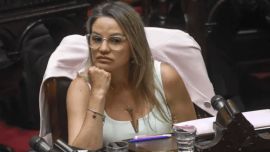Buenos Aires City Mayor Horacio Rodríguez Larreta on Friday accused Alberto Fernández of launching an “attack on the rule of law and democracy,” after the president provoked an institutional crisis by indicating he will not comply with a high-profile Supreme Court ruling.
The nation’s highest tribunal rejected an appeal by Fernández’s government this week in a long-running dispute over the breakdown of so-called “co-participation funds” brought in by federal taxes.
Favouring the opposition-controlled government of Buenos Aires City, the Supreme Court ruled that the capital – the wealthiest region in the country and legally autonomous – should have its share of federal funds boosted to 2.95 percent, upholding an injunction filed by Rodríguez Larreta’s government.
The dispute dates back to 2020, when Fernández’s Peronist government decreed during the coronavirus pandemic that City Hall’s share of federal funds should be trimmed from 3.5 percent to 2.32 percent. With the help of Congress, the figure was later cut to 1.4 percent.
Responding to the ruling, President Fernández – himself a law professor at the University of Buenos Aires (UBA) – said Thursday that he would not abide by it and seek the recusal of the four Supreme Court justices who made the decision.
"It is an unprecedented ruling, incongruous and impossible to comply with," said Fernández, in a document, which was backed by 14 Peronist governors. Four other governors signed a separate document rejecting the court's decision.
The president considered it to be "a political ruling in the face of an election year" – a reference to the general elections set for October 2023 – and declared it would damage less wealthy provinces.
He added that his government would “challenge the members of the Supreme Court” and their ruling, adding that the justices had failed to provide reasons to justify the hike to 2.95 percent.
Fierce reaction
The president’s intervention into the dispute prompted an immediate reaction from members of the opposition centre-right Juntos por el Cambio coalition and others from across the political spectrum. A number of business leaders said that the decision would be damaging for the rule of law and that the president had set a dangerous precedent and accused him of undermining the justice system.
In a rapidly organised press conference, Mayor Rodríguez Larreta accused the president of “breaking institutional order and attacking the rule of law and democracy."
The 57-year-old, a likely presidential candidate next October, said that his bloc of lawmakers in Congress were “analysing and working on other judicial and legislative actions to defend the rule of law."
"The president decided not to abide by the Supreme Court ruling, something [which is] very serious. This is not against the City, it is a breach of the constitutional order," denounced Rodríguez Larreta, who said that he will file a complaint before the tribunal and against the national government.
"Since 1983 [when democracy returned] there has been no precedent of this kind. Kirchnerismo seeks to annul the Justice system," said the opposition leader.
Former president Mauricio Macri said the decision would lead the country into "anarchy."
"President Alberto Fernández ordered [the government] to disregard the ruling of the Supreme Court of Justice. There is no precedent in Argentine history of such a serious disregard for another branch of government," the former president said on his Twitter account.
Background
So-called “co-participation funds” come from taxes collected at a federal level and are distributed among the 24 districts, i.e. the 23 provinces plus the autonomous city of Buenos Aires, where 2.8 million of the country’s 47-million-strong population lives.
In January 2016, then-president Mauricio Macri (2015-2019), who previously served as Buenos Aires City mayor (2007-2015), raised the capital’s share of funds from 1.4 per cent to 3.75 per cent, a percentage that was lowered to 3.5 per cent the following year.
This percentage increase was apparently justified by the need to compensate for a planned increase in spending due to the transfer of the control of the Federal Police to City Hall, but critics said it was an attempt to strengthen the opposition’s hold on the capital and favour his ally.
Fernández’s decision to reject the ruling came after he met a number of allied provincial governors who pledged their support.
"In an unprecedented, incongruous and impossible to comply with ruling, the Supreme Court of Justice of the Nation, without justifying the way in which it establishes this amount, decided to increase this percentage to 2.95 per cent, that is to say, it gives the City of Buenos Aires 2.95 per cent of the co-participation funds,” wrote the preisdent in a communiqué.
“ In other words, it grants the City of Buenos Aires more than 180 billion pesos in addition to what it already receives," said the statement, signed by Fernández and 14 governors, emphasising that the Court's ruling "also maintains, in an unusual way, that transferring these millionaire amounts to the CABA [Buenos Aires City] does not affect the Argentine provinces, which is completely false, since these resources would come from the national budget, which is executed in public policies throughout the country,” it added.
"In view of this, the President of the Nation has decided to instruct the competent bodies of the National State to REJECT THE MEMBERS OF THE SUPREME COURT (sic) and to present a request for the revocation ‘in extremis’ of the precautionary resolution issued," it concluded.
– TIMES/AFP/NA


























Comments